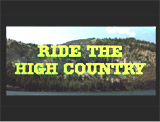
|
Ride the High Country (1962)
In Sam Peckinpah's classic revisionist western (often
considered the first "modern" western) - his feature film directorial
debut - an elegiac, end-of-an-era western, set in the early 20th
century, in the high country of the Sierra Nevada Mountains around
the mining town of Coarse Gold; it was always noted as the valedictory
'swan song' for iconic genre actors Randolph Scott and Joel McCrea,
both veteran lawmen in many iconic westerns:
- in the film's opening, the three main characters
were introduced as they met in the early 1900s in the town of Hornitos,
California (where automobiles had already been introduced); they
soon traveled together to the remote, high-country, remote mining
camp-town of Coarse Gold in the Sierra foothills - as a contingent
of bank guards for the transport of $250,000 dollars of gold bullion
(re-estimated at $20,000, but in reality was only $11,486), from
the mountain claims area back to the town's bank - a tough three
days journey of six miles each way
- the first of the three main characters to be
introduced was aging, spectacle-wearing, law-abiding "old-timer"
ex-federal marshal Steve Judd (Joel McCrea), wearing a tattered
and dusty coat and threadbare shirt
- the second character was Judd's old friend, former
lawman Gil Westrum (Randolph Scott) - first seen looking like Buffalo
Bill at a traveling carnival in Hornitos, where posters proclaimed
he was "The Oregon Kid" sharpshooter ("THE FRONTIER
LAWMAN WHO TAMED DODGE CITY AND WITCHITA AND WHO SINGLE-HANDEDLY
SENT THE NOTORIOUS OMAHA GANG TO THEIR GRAVES")
- at the bank, Judd was warned by the bank president
Luther Samson (Percy Helton) that the job of bank guard was dangerous:
"Six miners have been killed trying to get their gold to us. Six
miners killed and robbed, Mr. Judd"; Samson reiterated the changing
times: "The days of the forty-niners are past and the days of the
steady businessmen have arrived"; Judd was contracted at $40,
in order to hire two extra men to assist him at $10 each
- the threesome of hired bank guards included Judd,
Westrum, and Gil's hot-headed sidekick - womanizing, reckless gunslinger
and drifter Heck Longtree (Ron Starr)
- on the way to Coarse Gold, the three stopped at
the farmhouse of demanding, repressive, zealous, strict and
puritanical widower-patriarch Joshua Knudsen (R. G. Armstrong);
they also met his sheltered yet rebellious and spunky short-haired
farmgirl daughter Elsa Knudsen (Mariette Hartley in her film debut)
- during a dinner table sequence,
Knudsen prayed for the men ("Bless us, O Lord, and these our
guests and forgive them the mercenary desires which brought them
here"); he then warned against those who "traffic in
gold": ("To traffic in gold. Which to possess is to live
in fear, to desire, to live in sorrow...It says in the Book, gold
is a stumbling block to them that sacrifice to it and every fool
shall be taken therewith"); Judd traded Bible verses with
him: ("A good name is rather to be chosen than great riches.
A loving favor rather than silver and gold. Proverbs, Chapter 22");
Knudsen countered: "Into the land of trouble and anguish come the old
lions and they shall carry their riches on the shoulders of young
asses to a people that shall not profit them. Isaiah, Chapter
30, verse six"
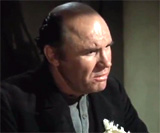
|

|
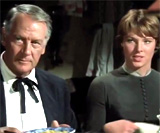
|
|
Joshua Knudsen and Judd Trading Bible Verses During
Dinner
|
- according to Knudsen, the mining town of Coarse
Gold was "a sinkhole of depravity. A place of shame and sin"; Elsa
regarded her father as unreasonably judgmental: "According to Father,
every place outside this farm is a place of sin...You don't have
to preach at everybody"
- even though Elsa's repressive father was
against her romantic intentions, Heck flirted with Elsa, causing
Judd consternation: "I'm not paying him $10 a day to go moonin'
after some girl whose old man's about to hind-end him with
a load of buckshot"; when Heck and Elsa met late at night to flirt
and talk, she informed him that she was engaged to one of the Coarse
Gold miners, Billy Hammond (James Drury) - just before her father
caught them; he angrily ordered her to the house; Heck retreated
to the barn where Judd intoned: "The mouth of a strange woman is
a deep pit and him that is abhorred of the Lord shall fall therein"
- farmgirl Elsa was reprimanded by her father for
disobedience ("I've got to keep the dirt away. Protect you from
the wrong kind of men"); when she reminded him: "That's everyone.
Every single man is the wrong kind of man, except you," she was
slapped in the face; although he apologized, the next day, she
ran away from the farm to escape her pious father and joined the
threesome on their journey to Coarse Gold; she told them her intentions:
"I'm not going back to my father. I'm goin' to Coarse Gold to marry
Billy Hammond"
- potential conflicts would soon develop
due to further flirtations between Heck and Elsa on the trek up the
mountain; Heck surmised: "My guess is, you're doing it to get away
from your pa. To get even, maybe" - and then she allowed him to
kiss her, although when he became agressive, she pushed him off
and resisted; Judd pulled him away and knocked him out with one
punch; Westrum also punched out Heck to remind him: "We're not
here for romance. Understand me, son?"
- once the group arrived in Coarse Gold - an encampment
of tents, Westrum described the run-down town: ("Lovely place.
A beauty spot of nature. A Garden of Eden for the sore in heart
and short of cash"); Elsa's drunken, white-trash fiancee Billy,
one of the miners, was revealed to have a number of
drunken, reprobate, no-good family members (including menacing
Henry Hammond (Warren Oates), Elder (John Anderson), Sylvus (L.
Q. Jones), and the youngest Jimmy (John Davis Chandler)) who also
wished to share the new bride
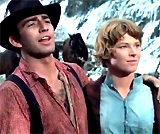
|

|

|
|
Elsa with Billy Hammond
|
Three Hammonds - (l to r): Elder, Sylvus,
and Jimmy
|
Henry Hammond
(Warren Oates)
|
- the remarkable sequence of Elsa's wedding ceremony,
in which drunken old Judge Tolliver (Edgar Buchanan) officiated
in a wedding ceremony performed in a squalid brothel (Kate's Place)
run by madam-bridesmaid Kate (Jenie Jackson)
with her prostitutes as flower-girls (Sam, Rose,
Belle, and Candy); Elsa, wearing her mother's wedding dress, was
surrounded by an assortment of rough, degenerate and drunken miners;
she was advised to have a drink before the "formalities";
Tolliver quietly and unexpectedly delivered a short but surprisingly
wise, profound and affecting speech about the meaning and sanctity
of a true marriage: "We're gathered here
in the high mountains, in the presence of this august company,
to join this man and this woman in matrimony. Now,
I'm - I'm not a man of the cloth and this is not a religious ceremony.
It's a civil marriage, but it's not to be entered into unadvisedly,
but reverently and soberly. A good marriage has a kind of a simple
glory about it. A good marriage is, is like a rare animal, it's
hard to find, it's almost impossible to keep! You
see, people change, and that, that's important for you to know
at the beginning - people change! The glory of a good marriage
don't come at the beginning - it comes later on - and it's hard work!"
|
Elsa Knudsen's and Billy Hammond's
Marriage Ceremony
|
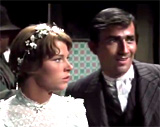
|
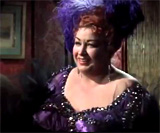
|
|
The Bride and Groom
|
Bridesmaid Kate (of Kate's Place) (Jenie Jackson)
|
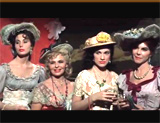
|

|
|
Flower Girls (Sam, Rose, Belle, and Candy)
|
Judge Tolliver (Edgar Buchanan)
|
- afterwards, Judd and Heck
were forced to rescue the girl from the camp when a major brawl
broke out after the marital ceremony, and Elsa was about to be
forcibly raped by her abusive and drunken husband - and also by
her brothers-in-law; with the help of Westrum (and the intimidated
Judge whose license to perform ceremonies was ripped up) before
a miner's court, Elsa's marriage was nullified; she was rescued
and for her own safety and protection, was to be returned to her
father's farm on their way back down the mountain
- during
their trip back, Judd (with Gil) discussed
right and wrong and how he knew the difference between them: ("That's
something you just know"); Judd claimed he finally realized
the value of self-respect and intended to stay that way: ("Now
I'm getting back a little respect for myself. I intend to keep it
with the help of you and that boy back there"); Judd stated
his goal to remain steadfast: "All
I want is to enter my House justified"
- however, double-crossing Gil Westrum
(with Heck) had been secretly plotting to steal
the gold shipment from Judd, and that night as they snuck away
with the gold bullion, Judd confronted them at gunpoint and expressed
anger at Gil's betrayal; he slapped him, returned his gun to his
holster, and challenged Gil to a gunfight ("Go ahead, draw! Draw,
you damn tinhorn!"), but Westrum refused to draw
- the next day, matters became more complicated when
the group was ambushed by the five angry and spiteful Hammonds
(who knew they had been tricked) who wanted Elsa back, and Judd
reluctantly joined forces with Heck and Westrum to fight off the
group; two of the brothers (Jimmy and Sylvus) were killed during
the mountain-side shootout gunfight, while Billy, Elder
and Henry escaped
- by the time the group arrived at Elsa's farmhouse,
Westrum had split from the group, armed himself, and then stealthily
followed after them; a classic shootout commenced at the farmhouse between
the group and the three surviving Hammond brothers (who had already
murdered Elsa's father) who were waiting to ambush the group; the
gunfight began across a barnyard of squawking chickens, as Westrum
watched from afar; Heck was wounded in the leg
and Judd was mortally wounded while trying to help him; Westum came
riding in to rescue the group
- the gunfight ended when Westrum challenged the
three Hammonds to a face-to-face in the open shootout: ("Two old
men against all three of you boys"); Judd added a further insulting
challenge: "And if them odds ain't enough for you damned dry-gulching
Southern trash, we'll send out the girl"; the Hammonds approached
and were shot down and eliminated, but Judd was hit again and dying

|
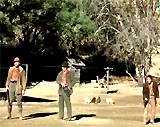
|
The Final Face-to-Face Open Shootout
The Two Old Men vs. Three Hammonds
|
- in his final moments, Judd asked
that to die in private, without Heck or Elsa (now a couple) nearby:
("I
don't want them to see this. I'll go it alone"); in
a scene of reconciliation between the two old pals, Westrum
pledged to follow Judd's wishes and deliver the gold as promised:
("Don't
worry about anything. I'll take care of it, just like you would
have"),
and Judd replied: ("Hell, I know that. I always did. You just
forgot it for a while, that's all")

|

|
|
Westrum to Judd: "I'll see ya later"
|
Judd's Death
|
- Judd's final words were: "So long partner" -
Westrum stood and replied (off-camera): "I'll see ya later",
then turned and walked off; Judd gazed at the faraway high-country
mountains in the background, and then as he slumped to his left
onto the ground, he died (off-camera)
|

Steve Judd (Joel McCrea)

Gil Westrum (Randolph Scott)
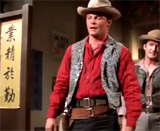
Heck Longtree (Ron Starr)

The Bank Guard Threesome

Elsa Knudsen (Mariette Hartley)

Father Joshua Knudsen (R.G. Armstrong)

Late-Night Flirtation Between Heck and Elsa, Caught by her Father

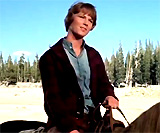
On the Trek to Coarse Gold
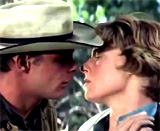
Further Flirtations Between Heck and Elsa

Arrival at Coarse Gold
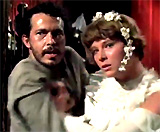
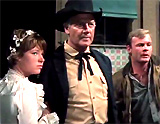
Elsa Rescued From Her Husband and Brothers-in-Law After Marriage Ceremony

Judd: "All I want is to enter my House justified"

Judd's Discovery of Westrum's Betrayal
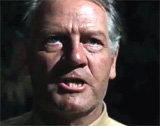
Judd's Dare to Gil: "Draw, you damn tinhorn!"
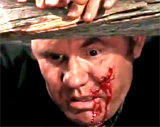
Elsa's Murdered Father

Judd Shot in the Gut While Helping Wounded Heck

Judd Wounded
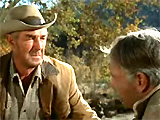

Final Words Between Two Old Pals: "I'll go it alone"
|






















